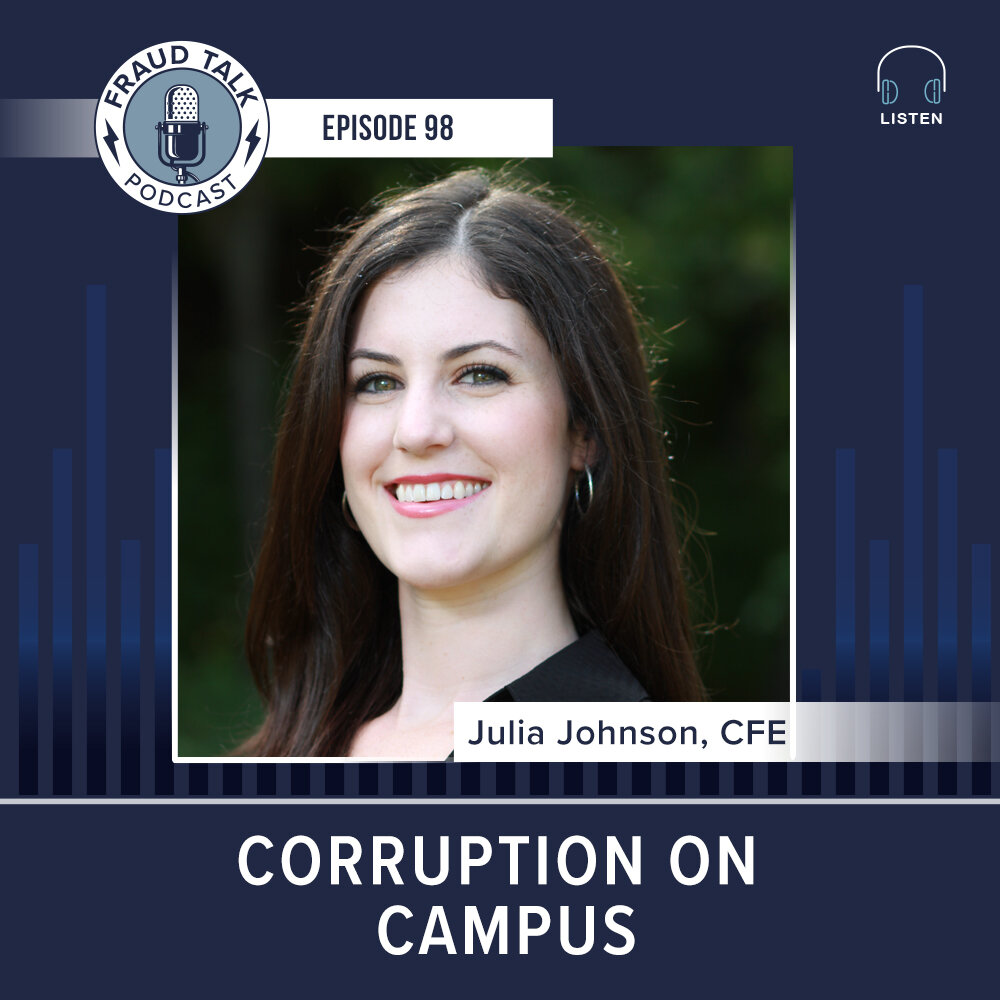Fraud Talk: Corruption on Campus
/While the celebrity college admissions scandal made headlines, there are many other types of fraud that affect colleges and universities. In this episode of Fraud Talk, ACFE Research Specialist Julia Johnson, CFE, explains different fraud schemes in higher education and how to prevent them from occurring.
Below is an excerpt from the full transcript, where Johnson discusses a recent case study in higher education fraud. Download the full transcript in PDF form or listen to the episode at the bottom of this post.
Sarah: You've been doing a lot of research into fraud in higher education. I feel like that idea got a lot of attention in the past year, thanks to that college admission scandal that had the celebrities going to jail and stuff. There's a lot more to fraud in higher ed than just admissions fraud. Can you talk about some of the common fraud schemes that you might see in universities and colleges?
Julia: Yeah, definitely. Obviously, the Hollywood admission scandal was a big thing to rock this whole topic of fraud. Everyone's really interested in it, especially with the high-profile individuals that were caught up, but after doing some research and really building this course on the topic, I realized that there was so many more areas of higher education that have specific fraud risks that some people might not even realize. Colleges, if you think about it, really operate kind of like a small city. They have all these different departments. They're just small little organizations each. With that, they each have their own unique fraud risks.
Obviously, with the amount of money coming in with federal grant money for research, and then financial aid for students and things like that, there's a lot of money coming into these schools and probably not as much oversight over that money as there should be. One of the main areas of higher education fraud is academic fraud, which involves students cheating or plagiarizing work of other individuals. This is especially becoming prevalent with the emergence of online courses. A lot of college courses are now either partially or fully online, which is obviously very… It's nice because it's able to reach a wider audience of students and some people who might not be able to come into class every day.
I think it really offers great benefits, but with that comes a higher ability for students to cheat on different things. One of the cases that I discovered while doing this research was… A few years back, the University of North Carolina at Chapel Hill had a huge scandal that involved some tutors that were doing work for student athletes. Under certain regulations for students to remain eligible to play in their college sports, they need to maintain certain GPAs and have certain passing grades in their courses. Obviously, they're practicing long hours and things of that nature, so, might not have as much time to get their schoolwork done. Tutors at this school were doing pretty much the entire bulk of the coursework for students.
Sarah: Sports, I feel like in colleges, you're talking about how there's so much money in universities and yes, some of it comes from the government and tuition keeps going up and up and up each year as everyone knows, from increasing student loans. But sports, I feel like, does bring in so much, they often credit those sports programs for getting extra alumni donations, for bringing fans, even stadium concessions and what they can charge for tickets and stuff. I can see why the area of sports and specifically collegiate sports is just a rife area for people to take advantage of stealing money in some way, shape or form through those programs.
Julia: Yeah, I definitely agree with that. For a lot of schools, especially big schools down in the South, their athletic programs are some of the biggest revenue generators for these schools. Then, the discussion comes into play about these students that are not paid, that generate all this revenue for these schools. There's a lot of payments that go on, like hush-hush payments that are made by coaches or companies that sponsor teams. Adidas just got into trouble for offering payments to try to get a certain high school student to go to a certain college that they sponsored.



